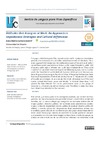Please use this identifier to cite or link to this item:
http://hdl.handle.net/10553/70420
| Title: | Attitudes that Annoy us at Work. An Approach to Impoliteness Strategies and Cultural Differences | Authors: | Pacheco Baldó, Rosa María | UNESCO Clasification: | 570107 Lengua y literatura 550510 Filología |
Keywords: | Power Identity Cultural differences Impoliteness strategies Social characteristics, et al |
Issue Date: | 2019 | Journal: | LFE. Revista de Lenguas para Fines Específicos | Abstract: | This paper, which forms part of the research carried out for my doctoral dissertation,
presents a new taxonomy of what I called social characteristics of individuals. This is
a new approach that reorganises the traditional concepts of face and social rights. I
named these social characteristics as follows: public image of singularity, public right
of equality, public right of affiliation and public right of independence. These social
characteristics are understood and emphasised differently by every culture. In other
words, the characteristics will be dealt with by every cultural group in their own way,
depending on and according to the cultural values of the group. Furthermore, these
four social characteristics of individuals can be attacked or threatened with a series
of impoliteness strategies. As an example, this article will analyse two of the most
studied cultural dimensions: power and identity. To illustrate these ideas, I will
present the data obtained from some questionnaires done by two groups of
respondents, a Spanish one and an American one. The different values that these
two cultures have will reflect on their answers. Este artículo, que forma parte de la investigación realizada para mi tesis doctoral, presenta una nueva taxonomía de lo que he denominado características sociales del individuo, con un nuevo enfoque que reorganiza los conceptos tradicionales de imagen pública y derechos públicos. He nombrado estas características sociales: imagen pública de singularidad, derecho público de igualdad, derecho público de afiliación y derecho público de independencia. Estas características sociales son entendidas y gestionadas de forma diferente por cada grupo cultural, dependiendo de los valores de ese grupo. Además, las características sociales podrán ser atacadas o amenazadas con una serie de estrategias de descortesía. A modo de ejemplo, se analizan en este artículo dos de las dimensiones culturales más estudiadas, la de poder y la de identidad. Para ilustrar estas ideas, se muestran aquí los datos obtenidos de unos cuestionarios hechos a dos grupos de informantes, un grupo de españoles y otro de estadounidenses. Los diferentes valores culturales que los hablantes de estos dos grupos tienen se verán reflejados en sus respuestas. |
URI: | http://hdl.handle.net/10553/70420 | ISSN: | 2340-8561 | DOI: | 10.20420/rlfe.2019.287 | Source: | LFE. Revista de lenguas para fines específicos [eISSN 2340-8561], v. 25 (2), p. 75-92 |
| Appears in Collections: | Artículos |
Items in accedaCRIS are protected by copyright, with all rights reserved, unless otherwise indicated.
